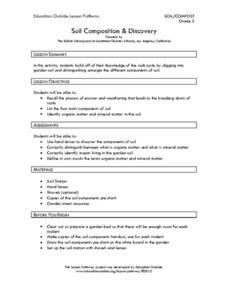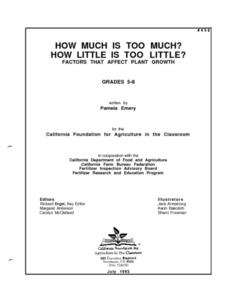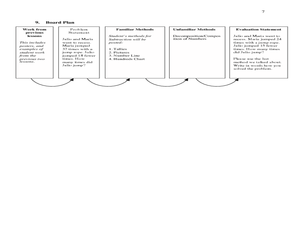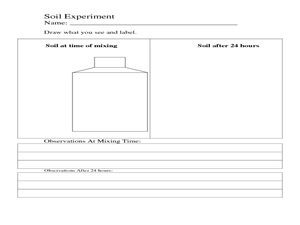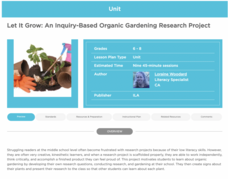Education Outside
Soil Composition & Discovery
Organic or mineral? How does the matter matter? Second graders use their knowledge of the rock cycle to label the different components in garden soil.
Texas Commission on Environmental Quality
Environmental Sciences
Whether you are teaching environmental science in junior high or studying recycling in kindergarten, there is something for all in this set of lessons designed for environmental education. The 110-page packet comes with tips for teaching...
PBS
The Lowdown — Rot and Rubbish: The Rancid Truth about How Much Food We Waste
Compare waste a percent at a time. The resource contains an infographic on food waste. Using images, the informative activity describes the amount and types of food waste that occur. Pupils compare the percentage of waste from their...
Purdue University
Food Waste Solutions
Easy doesn't always mean better. In an era with pre-packaged everything, learners consider the environmental impact of the convenient trend. They critique the packaging of food and how waste impacts cost and then look for solutions.
Curated OER
Micro-organisms and Human Life
In this biology worksheet, students identify and locate various vocabulary terms that relate to micro-organisms and human life. There are 20 biology terms located in the word search.
Curated OER
Illegal Dumping
Students go on an outing and note garbage near picnic tables. They brainstorm ways to be involved with anti-litter campaigns and write letters to local officials.
Curated OER
Using the Land
In this land worksheet, students review the different ways that land is used such as landfills, topsoil, farmland, and hazardous waste. This worksheet has 13 true or false questions and 1 short answer question.
Curated OER
How Much Is Too Much? How Little Is Too Little?
Students perform a series of experiments which show that plants require nutrients in certain quantities. They also cooperatively read materials on the nutrient requirements of plants, fertilizers, composting, and soil management, and...
Curated OER
WHAT'S ORGANIC?
Middle schoolers explore how certain foods come to be certified "organic." They write the words "organic" and "synthetic" and given the definitions of each. Students are given dictionaries. They are asked: "What is organic food?" Middle...
Curated OER
The Case of the Broken Loop
In this environmental awareness worksheet, students complete 8 pages pertaining to waste, landfills, recycling and composting. Included are: matching words and definitions, crossword puzzle, scrambled letters, a code, word search and a...
Curated OER
Mathematics Lesson Plan
Second graders study subtraction facts. For this mathematics lesson, 2nd graders discuss how to solve two digit subtraction problems. Students recognize that there are many different methods or strategies one can use such as using...
Curated OER
All Wrapped Up
Students work in teams to identify and sort types of packaging used in food production. They consider ways to reduce the environmental impact of packaging and reflect how consumer choices play a role in trash production.
Curated OER
EcoFluxx
Students describe examples of predator/prey relationships in nature explain how some animals protect themselves from predation better follow all directions presented to them become more flexible, adaptable and literate learners. They...
Curated OER
Vermicomposting
Third graders study vermicomposting. In this vermicomposting lesson plan, 3rd graders prepare to begin a unit on decomposition by constructing a worm bin. Students collect worms to be used later in experiments.
Curated OER
Fan 3: Sort and Color!
Students explore the concept of recycling. In this environmental stewardship instructional activity, students discover how to recycle and compost. Students complete an activity that requires them to sort recyclable items.
Curated OER
Rosa Parks Community Garden
Students explore gardening and nutrition in the Rosa Parks Community Garden. They work in stations to discuss food choices, the life cycles of plants, and mini-composting. After starting in one station, they rotate to try each activity.
Curated OER
How Can We Conserve Water?
Pupils describe the importance of water conservation and list ways to conserve. They construct composts and fill them with materials that recycle nutrients. They inspect their homes for leaky pipes, toilets, and faucets.
Curated OER
Under Our Feet
Young scholars investigate the forest ecosystem to learn of the living and non-living elements of the soil. In this ecosystem lesson, students examine soil for twigs, moss, fungi, leaves, roots and other matter. Young scholars complete...
Curated OER
The Trash We Pass
Where does our garbage go? What is the difference between a recyclable and non-recyclable item? Pose these important, but often overlooked, questions to your class and invite them to consider the lasting and damaging effects of the...
ReadWriteThink
Let It Grow: An Inquiry-Based Organic Gardening Research Project
How does your garden grow? An inquiry-based, organic gardening unit asks young scientists to research a vegetable or flower, create an environment for it, and then plant and tend to the seedling. Gardeners develop their own research...
Curated OER
Cows, Worms, and Compost
Students study decomposition. In this decomposition lesson, students discuss the background information about decomposition. Students then complete the 'Chew It Twice' worksheet.
Curated OER
Sarah Cynthia Sylvia Stout
Students listen to a poem about Sarah Cynthia Sylvia Stout and how she acts and feels about garbage. As they listen, they fill in the worksheet that goes along with the poem. Both the worksheet and the poem are imbedded in this plan.
Curated OER
Vermicomposting
Fifth graders explore agriculture by viewing compost related presentations. In this worm and soil lesson, 5th graders identify the relationship between good soil and the worms who inhabit it by reading assigned text in class. Students...
Curated OER
Are You Balanced With Your Environment?
Students discuss the impact of not keeping the environment in balance for future generations. As a class, they are introduced to the concept of "Balance of Nature" and what it means. In groups, they research the role of trees and how to...
Other popular searches
- Worm Composting
- Composting Third Grade
- Trash & Recycling Composting
- Importance of Composting
- 2 Liter Bottle Composting
- Composting Temperature
- Science of Composting
- Classroom Composting
- Worms and Composting
- Lesson Plans on Composting
- Composting Tag
- Composting Box


